|
|

|
|
|
Official Name
|
Federal Republic of Nigeria
|
|
Located
|
West: Niger, Benin, Cameroon
|
|
Capital
|
Lagos
|
|
Head of State |
President Umaru Musa Yar'Adua
|
|
Area
|
924,000 sq km
|
|
Population
|
122 million
|
|
Growth rate
|
3%
|
|
Languages
|
English, Hausa, Yoruba, Ibo & Fulani
|
|
Currency
|
Naira
|
|
GNP per capita
|
$1,220
|
|
Inflation
|
50%
|
Airlines
(advertise here)
|
from Europe: Virgin from London
from Asia: ________________
from USA: ________________
|
Hotels
(advertise here)
|
Names & Rates per night
______________________
______________________
|
|
USAfrica Agent
|
______________________
|
|
Country Advertiser
|
If you want to become
the Country Advertiser
your logo comes here.
|
|

Hausa Residence Kano
İ2001-2002: Africa Focus
|

Duke Town Calabar
İ2001-2002: Africa Focus
|
|
|
Nigeria is Africas most populous state inhabiting some of the most famous soccer players from Africa. Nigeria is
composed of about 250 ethnic groups, with diverse languages and religious faiths. The largest ethnic groups are the
Hausa-Fulani in the North, the Igbo in the Southeast, and the Yoruba in the Southwest.
Regional, ethnic, and religious differences have contributed to great instability, and Nigeria's development will
depend on the evolution of a political formula that takes into account the country's diverse characteristics.
Nigerian Philip Emeagwali, one of the "fastest" businessmen of Africa, the "Bill Gates of Africa", won the highest
honor in Computer Science.
|
The Sacred Grovesis Oshogbos is one of the countrys main attraction with inside the stunning Shrine of Ashun.
In addition to the natural beauty, there are many stunning sculptures, gates and walls put up by Suzanne Wenger,
an Austrian painter and sculptor who came here in the 1950s and became, in time, one of the priestesses. Oshogbo
is one of the main centers of Nigerian art Batik, woodwork and painting are the main media.
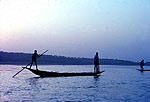
Benuw River
İ2002: Africa Focus
|
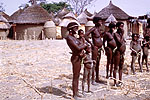
Bauchil Village
İ2002: Africa Focus
|

Bread baking
İ2002: Africa Focus
|
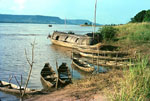
Niger River at Lokoja
İ2002: Africa Focus
|
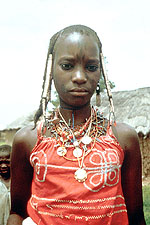
Fulbe Girl
İ2002: Africa Focus
|
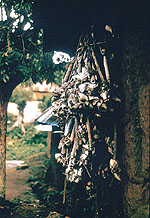
Juju Bones
İ2002: Africa Focus
|
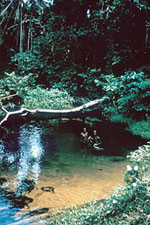
Mangrove at Calabar
İ2002: Africa Focus
|
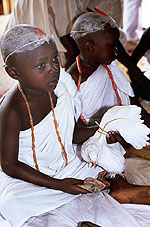
Etafa Ceremony
İ2002: Africa Focus
|
Oil revenues account for 80 to 90% of Nigerias income, around $8.5 billion each year. An unbridled and often
ill-considered "development" that has taken place, particularly in the cities, fuelled by what appeared to be an
endless source of oil money is one of the negative sides of the country. As a result many Nigerian cities are
sprawling, congested and as ugly as hell. Overcrowding, pollution, noise, traffic chaos, a soaring crime rate
and the inadequacy of public utilities combine to make most urban centers hellholes. Nigerian roads are dangerous
and traveling at night is as sensible as playing Russian roulette. Speeds of 150km/h are not unusual.
Nigeria s population is devided almost evenly between Muslims and Christians. Analysts say the recent upsurge of
sectarian violence in the predominantly Muslim north, followed the introduction of the Islamic sharia penal code
despite protests from non-Muslims.
In 2001, hundreds of people have been killed in religious clashes between Muslim and Christian gangs in Kano State
cities, Zangon, Jos and Kurana Asabe, also triggered by recent protests against US airstrikes in Afghanistan.
|
|
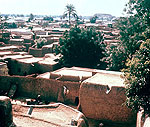
Kano
İ2002: Africa Focus
|
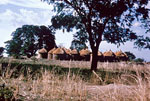
Village near Jos
İ2002: Africa Focus
|
|
Contemporary Nigerian Artists:
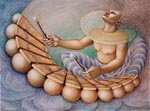 (c)art:
(c)art:
Efiong Valentine
|
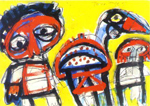 (c)art:
(c)art:
Loye Toyin
|
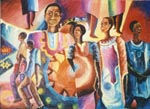 (c)art:
(c)art:
Omigie Oziegbe
|
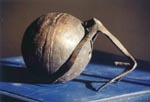 (c)art:
(c)art:
Onemu Josiah
|
Lagos:
|
Until 1991, Lagos was the capital of Nigeria. Today, this city is still of importance, being Nigeria's largest city.
This city still has the roots of many government bureaus. In the southwest part lies the business section of the city,
with its skyscrapers. This is where commerce, finance, administration and education flourish. The region contains many
universities, libraries and the National Museum.
|
|

Lagos
İ2002: Africa Focus
|
|
Economy:
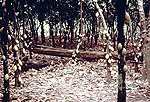
Cocoa Pods
İ2001-2002: Africa Focus
|

Bushfire
İ2001-2002: Africa Focus
|
|
|
Nigeria's economy is highly dependent on the oil sector which accounts for about 40 percent of gross domestic product
(GDP) and accounts for about 85 percent of the country's foreign exchange earnings.
With its large reserves of human and natural resources, Nigeria has the potential to build a highly prosperous economy,
to reduce poverty significantly, and to provide the health, education, and infrastructure services its population needs.
Despite the country's relative oil wealth, poverty is widespread and Nigeria's basic indicators place it among the 20
poorest countries in the world.
|
History:
The English colonized Nigeria after a 40 year long war, from 1861 to 1900. It has always been an extremely autonomous
country. The English presence was discreet and was limited to commerce; traditional leaders have always had the most
power. Around the latter part of the 15th century, the Yoruba fishermen and hunters had already settled in the area,
and called it Oko. Moreover, the kingdom of Benin dominated this area, which they called Eko, from the 16th to the 19th
century. The Portuguese first explored this city in the late 1400s and named it Lagos. They ultimately collaborated with
the local kings or obas to begin slave trade, which continued until 1851, when the British, trying to quell the slave
trade, launched a naval attack , and dethroned the oba. The slave trade continued until 1861, when it came under British
control. From 1866 to 1874, this city was a part of the United Kingdom's West African Settlements, after which it became
a section of the Gold Coast. In 1906, it again became a part of Nigeria; in 1914, it's capital. In 1960, Lagos was named
the capital of Nigeria after gaining independence. It was replaced in 1975 as the state capital of Lagos by Ikeja.
In 1991, Abuja replaced it as the national capital.
Nigeria attained independence from Britain in 1960. A succession of military governments have controlled the country
for 28 of its 40 years of independence. In June 1998, General Abdulsalami became Head of State following the sudden
death of General Sani Abacha. After a short one-year transition, the democratically elected government of President
Olusegun Obasanjo assumed power in Nigeria on May 29, 1999.
|
|
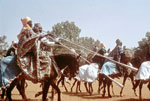
Sallah Celebration
İ2002: Tourist Office
|

Fulbe Cattle
İ2002: Africa Focus
|
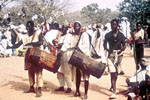
Sallah Celebration
İ2002: Africa Focus
|
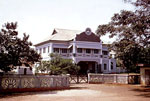
Oniof Ife Palace
İ2002: Africa Focus
|
|
Amina Sarauniya Zazzua: Queen of Zaria (1588-1589):
The province Zazzua is named after Queen Zazzua of Nigeria now known as Zaria. She was born around 1533 during the
reign of Sarkin (king) Zazzau Nohir. At the age of sixteen, Amina became the heir apparent (Magajiya) to her mother,
Bakwa of Turunku, the ruling queen of Zazzua. Queen Amina headed the northern Nigerian Hausa city-state of Zaria. It
is thought that perhaps the Hausa were matrilineal people at that time since having a woman as queen was not all that
rare. A great military leader, Amina brought most of the other Hausaland city-states into her orbit, and is credited
with encouraging them to surround themselves with huge defensive mud walls. Her military achievements brought her
great wealth and power. She is credited with popularising the earthen city wall fortifications, which became
characteristic of Hausa city-states since then. She ordered building of a defensive wall around each military
camp that she established. Later, towns grew within these protective walls, many of which are still in existence.
They're known as "ganuwar Amina", or Amina's walls.
Enabling us to improve the quality of the content, if you have additonal information, remarks or suggestions, please
share it with us by e-mail.
LAGOS, Nigeria, January 27 2002 Hundreds of people drowned in two canals as they fled massive bomb explosions
at an armory triggered by the blaze Sunday January 27th 2002 in Lagos. The armory stored Nigerias most powerful
bombs and other armaments in a crowded residential Ikeja district in north Lagos. Many victims apparently didnt
realize how deep the water was and drowned when they ran and drove vehicles into the canal. The explosions at the
citys Ikeja military base propelled shrapnel and shock waves for miles Sunday night. Newspapers said the final
toll could be about 2,000. The explosions began when a fire spread to the depot, which is surrounded by crowded
slums and working-class neighborhoods. State and military officials said the fire was accidental and not an
indication of military unrest.
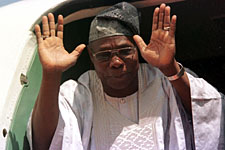
President Obasanjo
|
|
|
Jos, 15 October 2001:
Sectarian Violence
Nigeria s population is devided almost evenly between Muslims and Christians. Analysts say the recent upsurge of
sectarian violence in the predominantly Muslim north, followed the introduction of the Islamic sharia penal code
despite protests from non-Muslims
|
NIGERIA: 16 November 2001:
AGBANI DAREGO: MISS WORLD
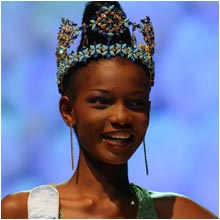
|
MISS NIGERIA: MISS WORLD 2001
At a glittering event LIVE from the Superbowl, Sun City in the heart of South Africa, the beautiful 18 year
young Agbani Darego, Miss Nigeria, was crowned Miss World 2001, among 93 contestants to a standing ovation
from an audience of over four thousand people seen by a 1.2 billion television audience around the globe.
Agbani Darego is the first black African to win the international beauty title in its 51-year history.
|
Agbani already signed a contract with Donald Trump's New York modelling agency after finishing in the top 10
at the Miss Universe pageant in May 2001. She has also catwalked with supermodel Naiomi Campbell in Spain.
Nigeria's first lady and two governors have planned receptions for her. "Plans were also said to be in the
pipeline by government to appoint the new queen an ambassador," the Vanguard newspaper reported. At her crowning,
Darego was keen to stress she intended to carry on her studies to become a computer scientist as well as carrying
out her Miss World duties.
KANO, Nigeria, July 7 2001 In the northern Nigerian state of Sokoto a man has had his hand amputed after
being convicted of stealing a goat. The amputation of 30-year-old Umaru Aliyu's right hand was carried out at
Sokoto hospital. The man was convicted by a Sharia court of stealing a goat valued at 4,000 naira (around 36 dollars)
and 6,000 naira cash. Presiding judge Bawa Sahali Tambuwal said the offence violated the Islamic or Sharia law
introduced in the state in August 2000. According to the Sharia law, a person is convicted to amputation when he
steals a property worth at least one-fourth of
dinar (around 869 naira. The amputation is the third in recent years in Nigeria. Two other amputations have earlier
been carried out in neighbouring Zamfara State.
LAGOS, July 5 2001 British tycoon Richard Branson flew into
Nigeria Thursday to publicise the launching of Virgin Atlantic
services on the Lagos-London route. Nigerian President Olusegun Obasanjo has
suggested to Branson that he take over the running of the country's moribund rail network
|
W A R N I N G:
In spite of the beauty of Nigeria with its friendly population and many honest business people, sadly enough in the
Western World, Nigeria is rapidly becoming known as the business fraud capital of the world. Of particular concern
is a scam known as the "419 scam" (after the Nigerian statute that makes it illegal). The way the scam works is that
you will typically be contacted by e-mail by someone who may be representing themselves as the agent for a Nigerian
corporation or government agency, who will suggest to you that if you can put up a "transaction fee,"
"performance bond," or similar sounding fee, to enable the scammer to complete a transaction within Nigeria, he
will give you a share of the money allegedly due him. They talk about multi millions of dollars.
This scam is often operated even by government officials. It is never legitimate. If you have been the recipient
of such an offer, DO NOT SEND MONEY OR COMMIT TO ANYTHING until you have read and absorbed information at the
419 Coalition web site.
|
Last update: 3 August 2009
|











